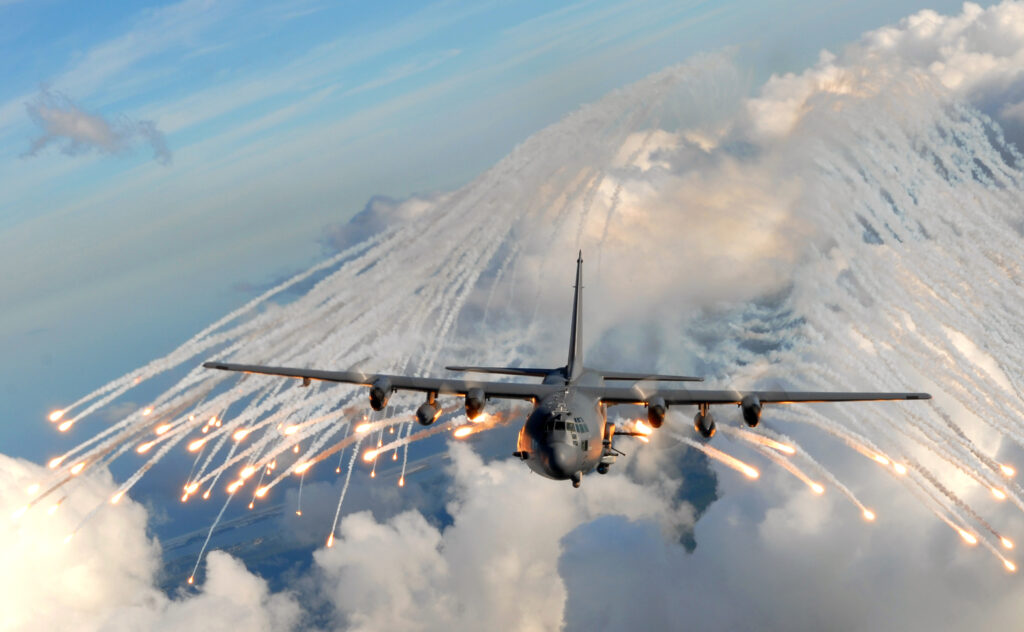AC-130 To Get Laser Guns & Air-Launched Drones: Heithold
Posted on

An AC-13U gunship fires defensive flares used to decoy heat-seeking missiles.
WASHINGTON: Lt. Gen. Brad Heithold, the head of Air Force Special Operations Command, wants to make the AC-130 a kind of flying aircraft carrier, launching mini-drones mid-flight to scope out threats and targets. Oh, and he wants the AC-130 to have a laser cannon as well.
Speaking to the Association of Old Crows’ annual conference on electronic warfare, Heithold didn’t spend much time talking about EW. Yes, the AC-130’s current defensive jamming and spoofing suite — comparable to that on the aging B-52 — will be upgraded on the future AC-130J model, but even that won’t be enough to protect the gunship against increasingly sophisticated future threats.
“It’s been very successful at this point in defending itself on the target,” Heithold said. “That is not going to be case going forward.”

Lt. Gen. Bradley Heithold
Instead, Heithold argued, AFSOC needs new ways to make its low-and-slow gunships more survivable: “The key, I believe, is to pursue high energy laser capabilities.”
Heithold sees both lasers and drones as having both offensive and defensive applications. It was the defensive side he focused on this morning. By shooting down enemy surface-to-air missiles, for example, a laser-armed AC-130 could defend not just itself but other coalition aircraft.
After a year of talking with “every industry partner who’s ever even touched a laser…I know the technology has matured now,” Heithold said. “I believe we can put a high energy laser — offensive and defensive — on an AC-130 by the close of this decade.”
That doesn’t necessarily mean turning the entire future AC-130J fleet into laser planes, but having “at least four or five of our airplanes modified in this fashion will help.”
A scientific advisory board is at AFSOC’s Hurlburt Field this week, Heithold said, to study the feasibility of installing a high-energy laser on an AC-130. AFSOC has also contracted with the Navy’s Dahlgren warfare center, which played a major role in putting a laser on the USS Ponce, to study shrinking their design to fit on an aircraft. He has commissioned a RAND study of the problem. Working with the Joint Staff, he said, “we’ve already developed TTPs [tactics, techniques, and procedures]” for the laser.
The mini-drone project is further along, with actual testing underway. It relies on fitting the existing Coyote UAV to the Common Launch Tube already used by some AC-130 variants to launch Griffin missiles. Once the Coyote (or an alternative UAV in the future) pops out of the tube, it flies itself along a preprogrammed orbit, while a crewman aboard the AC-130 watches the video feed and directs the drone’s camera towards new targets. (This way no human has to fly the drone hands-on every moment the way a Predator or Reaper would require).
Bring-your-own-drone has offensive applications. Coyotes aren’t armed, but they can scout out targets that the AC-130 itself can’t see, for example because of bad weather. “I’m a gunship guy that’s spent a lot of my life looking at the top of clouds,” unable to see the target, Heithold said. “I have to take that away from the enemy.”
But disposable drones can also protect their AC-130 mothership by probing danger zones. If enemy air defenses make it too dangerous to come close to the target, the gunship can attack from maximum range and send in the drone to make sure its attacks are still accurate.
“Now I don’t have to be on top of the objective. I can stand off somewhere and put this out,” Heithold said. “It gives me a sight picture before I ever get there.”
A week ago, Heithold watched live video from a Coyote drone launched off an AC-130, he said. His response? “Great. Let’s take it to combat.” AFSOC will train a crew to use the Coyotes and give them four of the mini-UAVs, then deploy them to a real-world combat operation.
For all these new technologies’ defensive potential, however, they can’t change the basic truth that the AC-130 is large, slow, and low-flying. A gunship isn’t a stealth fighter, and it can’t survive the same kinds of threats.
“It’s just the nature of the airplane,” Heithold said. “This isn’t going to be a stealthy C-130. Its going to be a survivable C-130 in a low- to medium-threat area.”
“Please don’t let the takeaway here be that I’m going to build these arsenal ships that can go anywhere,” he said. “I’m not going downtown” against a well-armed nation-state.
Subscribe to our newsletter
Promotions, new products and sales. Directly to your inbox.
